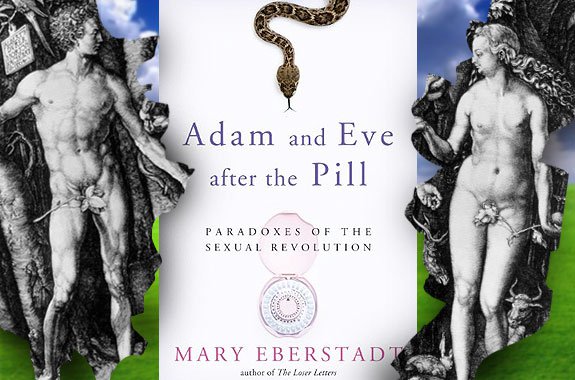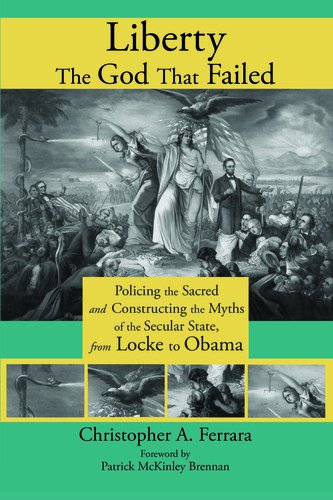
A limp shiver went down the collective spine of social media last week with reports about Japan’s sexless youth. It all boils down to young adults not wanting the messy complications of personal commitment because they interfere with their much more demanding and immediately rewarding jobs (and internet porn). It’s the economy, stupid!
Eberstadt’s provocative little book Adam and Eve After the Pill surprised me by suggesting, between the margins, that the breakdown of marriages in the West can be attributed to the same economic factors. Between the lines, I say, because she doesn’t make this argument directly.
Her book starts out by documenting the overhyped false consciousness of Marxist professors who refused to acknowledge the utter failure of Communism deep into the 80’s, even the 90’s. For some even Solzhenitsyn and black books of Communism didn’t quite do the job.
She then goes on to present the failures of the sexual revolution (plague of divorces, sexlessness [US TOO!], infertility, the harms inflicted upon women and children) as yet another example of the false consciousness of leftist intellectuals. They just don’t want to see the harshly ironic reality behind the realization of their 60’s Utopian dreams of unfettered sexual liberation. I mean, does anybody still even remember Herbert Marcuse’s make love not war argument in Eros and Civilization when we have a “progressive” president who gets a free pass on callously joking about being good at killing people?
The problems Eberstadt documents are so depressing I don’t want to go into the details. The fascinating thing is how she continually harks upon the moral and economic costs of the sexual revolution. She is so blinded by her own neo-conservative ideology that she doesn’t make the connection that maybe “It’s the economy, stupid” (the link suggests the population at large doesn’t realize it either).
It’s unfortunate she didn’t read Benedict more faithfully. He was prone to making connections such as this:
“Both capitalism and Marxism promised to point out the path for the creation of just structures, and they declared that these, once established, would function by themselves. And this ideological promise has proven false.”
How much can we continue to grow the economy? How much more merde can we produce? How much more pollution can we afford? How much more time are we willing to sacrifice to Wall Street? How many more relationships can we lay at the altar of growth before we shrivel away into robots subservient to the threat that “We won’t have an economy Monday“? Michel Houellebecq’s hilariously painful novels The Elementary Particles, The Map and the Territory, and The Possibility of an Island suggest there might be no return to the Catholic principle that small is beautiful (as if people mattered).

I’m presently also reading excerpts from a strange big book, Chris Ferrara’s Liberty, the God that Failed. Here is someone who also makes the connections Ebestadt doesn’t make in her Adam and Eve After the Pill and its more recent expanded version How the West Really Lost God. After all, the nauseating Sartrean myth of absolute human freedom is behind the market, the sexual revolution, and the degradation of the environment (none of them want regulation!):
“The libertarian acolytes of Liberty argue that it is not Liberty but the State that oppresses us. Rejecting the entire Western tradition, they declare that life in the State is not natural to man. The State, they maintain, arises from the unnatural imposition of organs of government upon a naturally free civil society by an age-old conspiracy of nefarious ruling elites, who have somehow managed to persuade generation after generation, in virtually every place on earth, that government is necessary. If only the unnecessary organs of government—kings, parliaments, presidents, congresses, governors, public magistrates, and so forth—can be eliminated, the ‘monopoly of force’ by which the elites have for so long oppressed the Western masses will be ended, and civil society will triumph in the freedom and prosperity of the ‘spontaneous order’ that arises from voluntary human cooperation. The State will wither away, just as it does in the dreams of Marxists. It will be the Second Coming of Liberty, whose first coming in 1776 ended with Liberty’s crucifixion by the Federalists, who gave the world yet another State (as if there could have been any other outcome).”
I’m not sure where Ferrara’s argument is heading (which is somewhat refreshing), don’t know if I’ll agree with his final conclusion(s), as I’m only fifteen pages into a 650 page book. But he does make the connection between the myth of unbounded human freedom (to do and produce as we please) to the societal disasters that concern Eberstadt so much. At least he’s outmaneuvered her ideological blinders. We’ll see if he falls into a different set of blinders.
All of this tangentially reminds me of the documentary film Tranceformer attached to the Criterion Collection edition of Lars von Trier’s The Element of Crime. There von Trier talks about how his over-educated parents brought him up in complete Utopian freedom. He then turns around and attributes his numerous obsessive phobias to getting no guidance through parental limits. It’s one of the most depressing things I’ve seen anyone admit on tape. It breaks your heart. One thing I do believe is that the disgust we so often feel at watching von Trier films has to do with the unwillingness to admit that his neurotic visions at bottom describe the formless aridity of our lives.

And really, you know something is rotten when even The New York Post starts making Spenglerian pronouncements such as this one in the article “When did White Trash Become Normal?”
“Students of Arnold Toynbee, the English historian, will recognize what is going on here [. In a chapter of his ‘A Study of History‘ entitled ‘Schism in the Soul,’ Toynbee argued that it is a sign that a society is disintegrating when it takes its cues for manners and customs from the underclass. He describes such societies as being ‘truant’ to their own values.”
Given my own anxieties, phobias, and lack of discipline I sometimes wonder whether we’re locked down in a Stockholm Syndrome and God won’t once more move upon the waters of the void:
=======================
If you’ve stayed with me this far do take a look at the Cosmos TOP 10 lists about the following topics: recent theology, poetry, novels, heaven and hell, religion and world politics, science, and non-fiction I’ve cheated on, and fiction I’ve cheated on.











